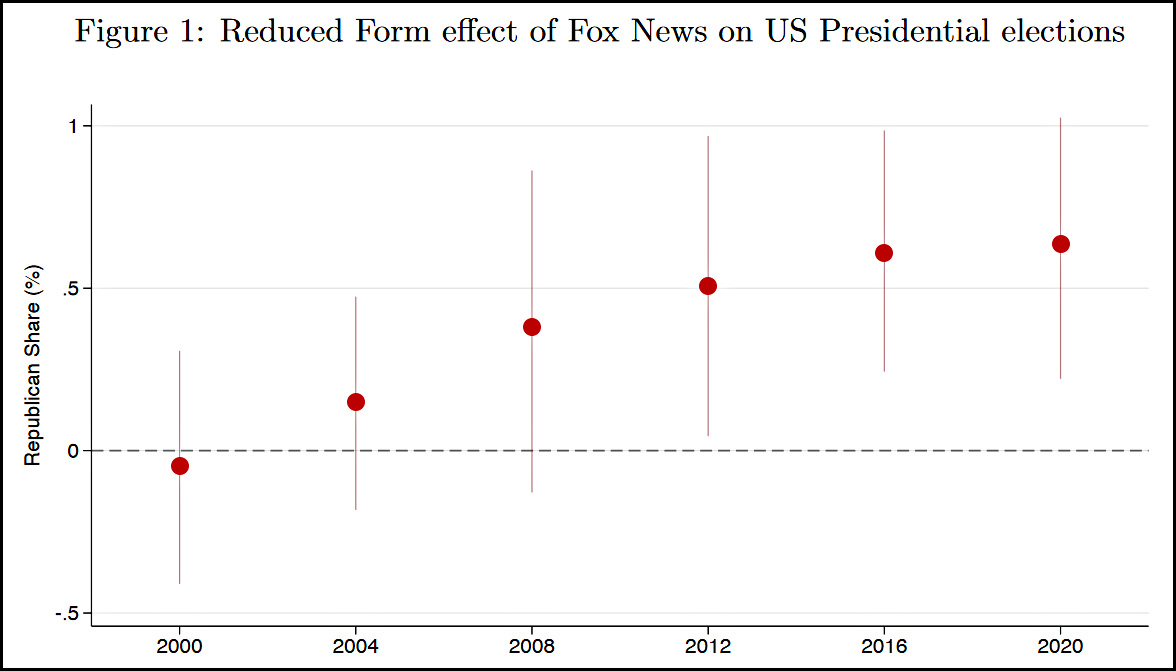Today brings an updated paper on the impact of Fox News on American elections. Here's the basic chart for presidential elections:

The methodology is the same one the authors have used before, which relies on the channel position of FNC in local markets. It turns out that the lower the channel position the more a channel is watched, but the channel position is basically random. This provides a way to answer the question: "If someone is randomly exposed to more Fox News, what happens?"
The answers are (a) they become more conservative, (b) they become more Republican and (c) they vote more for Republicans. The results are substantial:
A one-standard-deviation decrease in FNC’s channel position increases the share of Republican voters by about .75 percentage points....The effect sizes are substantively quite large. Indeed, the effect of just a one standard deviation shift in FNC’s channel position (roughly 29 positions), which induces about 7 minutes of additional viewership per week, is larger than the effect of a one standard deviation change in local real wages.
If I'm reading this right, it means that seven minutes of Fox News per week is likely to increase the Republican share of the vote by 0.75 percentage points. The authors find similar effects for House, Senate, and Governor's races.
As you can see from the chart, the effect of Fox News increased steadily early on, as Fox became more conservative at the same time that it broadened its reach on cable systems. It appears to have stabilized more recently, which is unsurprising since Fox is on pretty much every cable system now and can hardly crank up the conservo-meter any further.
This is the kind of research I'd like to see for social media. It wouldn't be easy since you need to find some kind of endogenous instrument (like channel position) to base your comparison on, and it's not clear what that might be. And the results are likely to be fuzzy since social media, unlike Fox, is not 100% ideological in a specific direction. Still, someone clever needs to take a crack at it. Based on the evidence we have right now, I suspect that the impact of social media on elections is fairly small, but it would be nice to see something more rigorous on the subject.

That IS a remarkable effect, and I agree more such research would be both interesting and useful -- although I'd be willing to bet the networks themselves have already conducted it and in great depth.
BUT, let us remember that correlation does not necessarily mean causation, and even if there is causation, it doesn't tell us whether they vote Republican because they watch ox or they watch Fox because they vote Republican.
Personally, I'd be willing to bet it's a more complex positive-feedback relationship. But its exact nature, and the magnitude of each effect, would take a lot of careful experimentation to sort out, and even then you'd want to be skeptical of the results, because the test subjects, being Republican, would lie.
That all the channels at the lower end of the dial get watched more seems to suggest a generalized laziness and lack of interest, precisely reflecting the very kind of people who just swallow wingnut news.
"a generalized laziness and lack of interest, "
Pretty good description of cable TV viewers generally. Went over to streaming years ago, and that seems to describe the mossbacks who continue paying exorbitant fees for an array of channels they never watch. They also seem to be afraid of learning a new system of watching, so timidity may enter in to that.
What is the authority for the proposition that channel positions are random? My understanding was that operators put the popular channels (or the channels they think will be popular) lower on the dial.
Good question. Random? Really? was my first reaction also. Another alternative hypothesis is that channel numbers are in part first-come, first-serve -- and cable operators in more conservative markets added Fox News to their lineups earlier than operators in more liberal markets. Either alternative suggests that conservative lean causes more Fox-watching, rather than vice versa.
At least Fox doesn't get taxpayer subsidies like NPR/PBS ( every corporate donation to those propaganda organs is a tax-expenditure eligible to be written off)